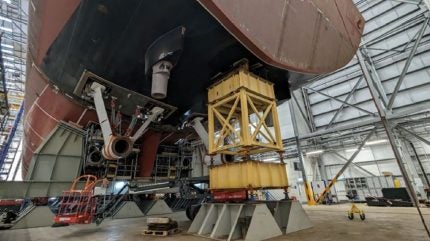
The build process of the first-in-class Type 31 frigate HMS Venturer has progressed in Babcock’s Rosyth shipyard with the completion of the ‘drop stern’ procedure which saw the removal of support brackets from the aft end of the ship, allowing the stern to settle at its design position.
Taking place towards the end of March, the drop stern is seen as a significant step as it positions the aft end of the ship and requires a high level of structural maturity in the ship’s structure in order to be carried out.
The completion of the drop stern, which was performed with the help of ballast weights, will enable builders Babcock to start final positioning and welding of the stern tube and shaft support brackets, following by the shaft line installation itself, Babcock told Naval Technology.
Meanwhile, Babcock said that progress on the second-in-class HMS Active was “good” following the steel cutting in January 2023 and keel laying ceremony in September of the same year.
Work is continuing on Active’s two engine rooms, while a four-week blast and paint cycle is about to begin. The first two gull block are also nearing completion with outfitting being carried out in parallel in readiness for both major lifts to make the start of the ship assembly.
Survitec to supply rafts and netting for Type 31 frigates
Meanwhile, Survitec has been awarded a contract to supply its survival technology for the five Type 31 frigates being built for the UK Royal Navy. Under the terms of the agreement, Survitec will manufacture and supply four 100-person and four 25-person life rafts to each vessel.
The contract also includes the supply of six scramble nets and ladders to each vessel, as well as follow-on servicing and maintenance.
The first Type 31 frigate, HMS Venturer, is expected to be launched later in 2024, with the build of all five vessels expected to be completed by 2028.
Commissioning into the Royal Navy will take around three years for HMS Venturer, which is likely to begin its service life from 2027, with its four sister ships following at one-year intervals through to 2031.




